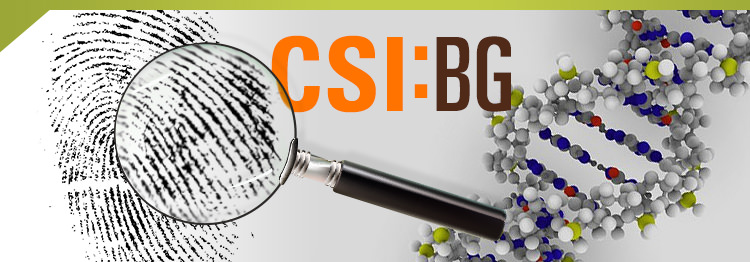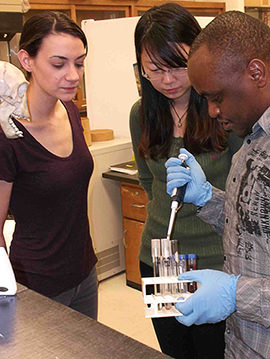CSI:BG
BGSU adds forensic specializations to degrees

By: Bonnie Blankinship
The announcement by the state last spring that it would build a Bureau of Criminal Identification and Investigation crime lab on campus prompted the creation of a new focus area at the University. Starting next fall, the departments of criminal justice, chemistry and biology will offer undergraduate specializations in forensic sciences.
"As soon as the president and the attorney general made the announcement about the building, my phone started ringing off the hook," remembers Dr. Steven Lab, chair of the criminal justice department.
With interest in forensics already piqued by popular television shows such as "CSI," the new specializations fit perfectly with students' desires, Lab said. BGSU will join the very small number of colleges nationally with on-campus crime labs. Having access to personnel from a state-of-the-art crime lab through internships and guest lectures will provide students opportunities for gaining the knowledge and skills that will help prepare them for careers in public safety and the growing field of forensic sciences.
Dr. Michael Buerger is developing the introductory forensics investigation course for criminal justice. The department is also planning a course on legal aspects of forensic investigations that will be open to forensics students in chemistry and biology as well, Lab said.
Because these are undergraduate specializations, many of the basic courses are already in place. In a process that is expected to take about two years, the departments are creating additional courses tailored to forensic sciences.
The biological sciences department will develop a new class: Molecular Biology Techniques Laboratory to train both forensic students and molecular biology students in molecular techniques used in forensics labs and elsewhere. "We hope to have it running next spring," said department Chair Jeffrey Miner, adding that the University will then be among a limited number of schools offering such a class.
The molecular lab classes will be small, and students will work closely with Dr. Scott Rogers, who has experience in the discipline.
"There is a tremendous realm of possibilities with forensics, from accounting to anthropology and psychology""Science is driven by technique," Miner said. "You have to be able to do high-end work to get a job in the molecular biology and forensic science areas. I think every undergraduate student in molecular biology and forensics, including some graduate students, will want to take this course."
Currently, BGSU teaches undergraduate molecular biology as a lecture class due to the necessary equipment and facilities required for a lab course. The department would like eventually to expand its facilities to accommodate the anticipated forensics specialization students, he said.
The biological sciences department will also be able to adapt many of the existing foundational classes, such as genetics, evolution and medical entomology, to include a forensic aspect, Miner said.
"I had long thought forensics would be a natural extension of analytical chemistry," said Dr. John Cable, chemistry department chair. "That's where the overlap lies. Analytical chemists basically ask 'What is this substance and how much of it is present?' Linking this with forensic science means applying the standard techniques we use to samples relevant to forensic investigations."
Looking for the presence of and identifying drugs would be a primary example, he said. Other substances typically might include paint, ink and other compounds.
Analytical chemists utilize such methods as mass spectrometry and gas chromatography, and the chemistry department will train forensics specialist students in applying these to investigations, Cable said.
In designing the forensic chemistry course, he and Dr. Stephania Messersmith worked with the assistant laboratory director and laboratory supervisor at the current BCI lab in Bowling Green.
 The academic planning for all three departments has been on a fast track and has involved faculty and staff from across campus. Following the partnership announcement, a group traveled to visit crime labs on the campuses of other schools, including London, Ohio, and a recently built facility at Alabama State University in Montgomery.
The academic planning for all three departments has been on a fast track and has involved faculty and staff from across campus. Following the partnership announcement, a group traveled to visit crime labs on the campuses of other schools, including London, Ohio, and a recently built facility at Alabama State University in Montgomery.
The discussion has been to have labs with glass walls open to the hallway where students can observe evidence being examined and listen on speakers to the discussion going on in the room. "This allows students to see real investigations taking place without risk of contaminating the evidence," Lab said.
In February, a BGSU group attended the National Institute of Justice forensics conference in Washington, D.C., and also met with Ohio congressional representatives to discuss possible funding support for the new programs.
Michael Schuessler, Design and Construction, is project manager for the facility, which is set to break ground in the fall and be operational in fall 2014. SSOE Group of Toledo is the architecture firm, and Quandel Construction Group of Westerville is the construction manager.
"We will be proceeding as quickly as possible on the design of the facility with the BCI group," said Robert Waddle, assistant vice president for capital planning.
"There is a tremendous realm of possibilities with forensics, from accounting to anthropology and psychology," Lab said. "We have to now build capacity to take advantage of them."
Updated: 12/02/2017 12:54AM
